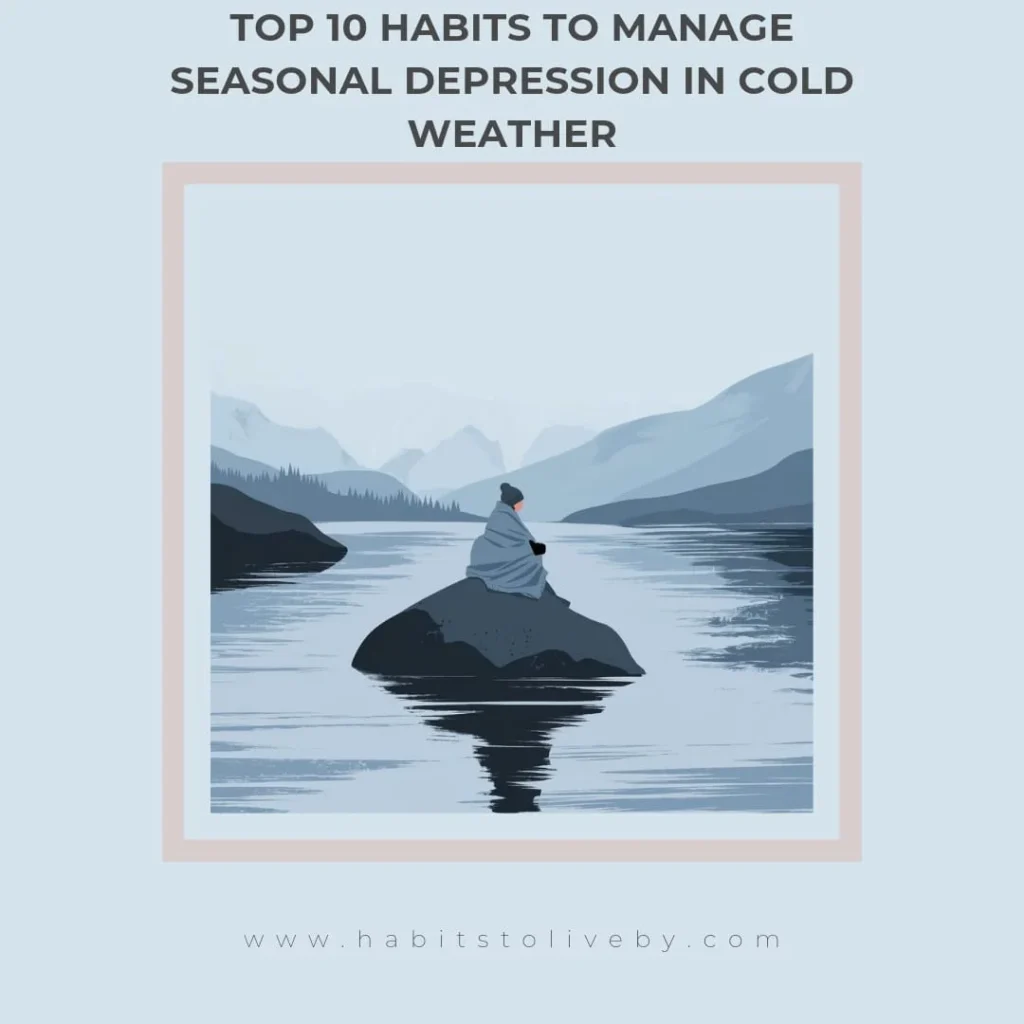Winters are a magical time of the year—cozy evenings by the fire, BBQ with friends, hot coffee, and festive holiday vibes everywhere. However, for some, winter comes with a noticeable shift in mood and energy. Feelings of sadness, loneliness, and despair can dominate this season. This condition, known as Seasonal Affective Disorder (SAD) or seasonal depression, affects millions worldwide, making winter especially challenging. Learning how to manage seasonal depression is crucial for those affected, as SAD can make the colder months feel unbearably long. With the right habits, winter can still be a season of joy and renewal.
Seasonal Affective Disorder (SAD):
Seasonal Affective Disorder is a form of depression triggered by changes in temperature, disturbances in the daylight and weather patterns, and a lack of motivation to leave the bed and get going with daily chores.
As mentioned in the National Institute of Health’s article, the symptoms of seasonal affective disorder start to appear in late autumn or early winter. However, some people develop these symptoms during summer, and their condition is known as Summer Pattern SAD, which is less common.
Signs and Symptoms of SAD
The American Psychiatric Association has declared SAD as a major depressive disorder, which is characterized by the following signs and symptoms.
- Sadness, being depressive throughout the day
- Weight gain, carbohydrate cravings.
- Feeling helpless
- Restless
- Loss of energy, easily fatigued
- Difficulty concentrating
- Changes in sleeping pattern, usually sleeping most of the time
- Feeling guilty
- Physical pains, like headache, stomachache, cramps, and digestive problems.
- Social withdrawal
- Suicidal thoughts
SAD may sound severe, but you can take proactive steps to manage seasonal depression. Healthy habits tailored to winter’s unique challenges can improve your mood, energy, and overall well-being. In this guide, we’ll explore 10 practical cold-weather habits to help you beat seasonal depression and enjoy the season to its fullest. These habits are simple yet transformative, whether it’s soaking up natural light, staying active, or connecting with loved ones.
Let’s dive into these strategies to make winter bearable and enjoyable!

Top 10 Habits to Manage Seasonal Depression in Cold Weather
- Surround Yourself With People That Make You Happy:
Staying isolated can make things worse. Stay connected with people who make you happy. Plan regular get-togethers with friends and family. It could be a family dinner or just a movie night. Stay in touch with your loved ones physically or virtually.
- Soak Up Natural Light:
During winter, people tend to stay indoors, due to which their exposure to sunlight is minimal. This makes them gloomy. So, it’s always better to stroll out for a walk during those winter days or plan a day to the beach to keep yourself happy and motivated. If sunlight is limited, consider a light therapy lamp to mimic natural daylight and improve your mood.

- Maintain a Consistent Sleep Schedule:
A consistent sleep schedule is beneficial for mental health, especially during winter. Going to bed and waking up simultaneously daily helps regulate your body’s internal clock. Avoid screens before bedtime, as blue light can interfere with sleep quality.
4. Practice Mindfulness and Meditation
Mindfulness is a powerful tool to manage seasonal depression. Dedicate 10 minutes daily to mindfulness exercises like deep breathing, body scans, or gratitude journaling. Apps like Calm or Headspace offer guided meditations tailored for stress relief and emotional balance. If meditation feels daunting, start with simple practices like focusing on your breath or enjoying a mindful walk. Mindfulness shifts your focus to the present moment, reducing anxiety about the future or regrets about the past. It’s a simple yet effective way to ground yourself and find peace during winter.

- Engage in Creative Hobby:
Winters are the perfect time to engage yourself in a creative hobby. You can start knitting, writing, painting, or cooking. Having a hobby and working on it can give a sense of joy and accomplishment. Stay happy and manage seasonal depression by keeping yourself accompanied by a creative hobby.
- Maintain a Balanced Diet:
Our mental health is greatly affected by what we eat. Foods rich in Vitamin D (Salmon and certain cereals), Omega 3-Fatty Acids (Walnuts and flaxseeds), and at least five servings of green vegetables or fruits should be included in our diet. Opt for fiber-rich food, legumes, bananas, brown rice, and corn to maintain a balanced diet and manage seasonal depression.

- Take a Vacation:
It’s always a great idea to break the ice and hit the road. A vacation doesn’t mean it has to be a big trip; you can plan a weekend retreat and make a trip to a beach or a hill station. Taking a vacation from your daily routine can uplift your spirits and make you happy. Use this time to disconnect from stress elements and connect with yourself. Winter trips, big or small, can be a reminder that winters are for exploration and joy.

- Stay Hydrated:
During winter, hydration often goes unnoticed, leading to mood changes and decreased energy levels. Aim for at least eight glasses of water a day. If cold water doesn’t appeal, opt for warm beverages like green tea, herbal tea, coffee, etc., and foods with high water content, like cucumber and oranges, which help achieve the hydration goals. Staying hydrated keeps your body functioning optimally, enhances mental clarity, and reduces feelings of fatigue, making it easier to manage seasonal depression.

- Be Kind and Help Others:
Acts of kindness can do wonders for your mental health, especially during the winter months. Moreover, helping others spreads joy and creates a sense of purpose and fulfilment. For example, whether you’re volunteering at a local shelter, shovelling a neighbour’s driveway, or simply offering a listening ear, small gestures of kindness can uplift both the giver and the receiver. Studies show that helping others triggers the release of endorphins, the brain’s “feel-good” chemicals, reducing stress and boosting mood. Therefore, make kindness a habit this winter—it’s a simple yet powerful way to combat seasonal depression while brightening the world.
- Seek Professional Help When Needed:
Sometimes, self-care habits aren’t enough, and that’s okay. If your symptoms persist or worsen, don’t hesitate to seek professional help. Therapists can provide coping strategies tailored to your needs, while medications like antidepressants may offer relief. Online therapy platforms make connecting with mental health professionals from the comfort of your home easier than ever. Remember, seeking help is a sign of strength, not weakness. Professional support ensures you have the tools and guidance to manage seasonal depression effectively.
Conclusion
Winter doesn’t have to be a season of struggle. By adopting these top 10 habits to manage seasonal depression in cold weather, you can take control of your mental health and enjoy the season to its fullest. Small changes like soaking up sunlight, staying active, and being kind to others can greatly affect your well-being.
FAQs on Seasonal Depression
Q1: What are the main causes of seasonal depression?
- Seasonal depression is primarily caused by reduced sunlight, which disrupts your biological clock and lowers serotonin levels.
Q2: Can diet alone improve seasonal depression?
- While a balanced diet helps, it’s most effective when combined with other habits like exercise, light therapy, and mindfulness.
Q3: How long does seasonal depression typically last?
- Symptoms usually start in late fall or early winter and subside by spring or summer.


Pingback: Daily Habits of Positive People: How They Think and Thrive - Habits to Live By